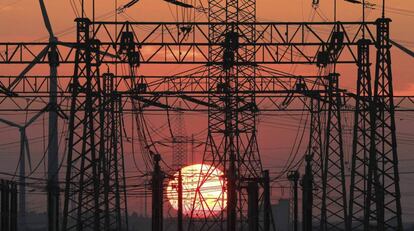Brussels chides Spain over subsidies for harmful fossil fuels
European Commission report notes Madrid near bottom of EU ranking for collection of green taxes

Spain is among the European Union member states with the lowest levels of environmental taxes. The latest figures from Eurostat, from 2014, show that Spain collected €19.2 billion from taxes on pollution, transportation, energy and the use of natural resources, equivalent to 1.85% of GDP, compared to the EU average of 2.5%. Half of these kinds of taxes were paid directly by consumers through their electricity bill or at the gas pump.

In recent years, multilateral organizations such as the European Commission, the International Monetary Fund (IMF), the World Bank and the Organisation for Economic Co-operation and Development (OECD) have all called on the Popular Party (PP) administration of Prime Minister Mariano Rajoy to raise so-called green taxes.
The government is putting the finishing touches to a new tax on hydrocarbons in response. No details are known, but the government has told Brussels that it plans to raise around €500 million more in environmental taxes in 2017.
A comprehensive new European Commission report looking at how EU environmental policies and laws are applied on the ground across the 28-country bloc reminds the Spanish government that in 2014 it tasked a committee of experts headed by economist Manuel Lagares to list tax reform proposals.
The energy industry is accused of pressuring central and regional governments to prevent them from raising taxes
That committee came up with several recommendations to “harmonize and improve the functioning of environmental taxes in Spain, increasing revenue in a logical and sustainable way.” But the recommendations “do not form part of the tax reform approved in Spain at the end of 2014,” said the Commission in its European Implementation Review package.
“Reducing subsidies that are damaging to the environment is another key challenge,” notes the European Commission. “Spain is still subsidizing fossil fuels, local coal, company cars and diesel,” it says, adding: “Spain has no overall strategy to eliminate environmentally harmful subsidies.”
The European Commission illustrates this use of fossil fuel subsidies through the so-called diesel-gasoline differential, saying, “This is not justified from an environmental perspective,” pointing out that “diesel emits higher levels of several atmospheric pollutants and should be taxed higher.” But Spain’s taxes on diesel are lower than on gasoline. The result is more diesel cars. “Currently in the EU more than 55% of new registrations are diesel cars; while in Spain this goes up to 63%.”
A recent study by three Spanish academics on green policies entitled Las Nuevas Reformas Verdes (New Green Reforms), concludes: “Environmental tax has still not managed to carry out a relevant role in international tax reform due to institutional restrictions.” It adds: “In the case of Spain, environmental taxes have so far not played a relevant role. The government has always been reticent about incorporating these instruments and has only done so tangentially to resolve short-term revenue or regulatory problems, which is why Spain is currently at the bottom of European rankings in the use of these taxes.”
More than 55% of newly registered cars in the EU are diesel, while in Spain the figure is 63% European Commission report
The authors argue that “the academic evidence shows major possibilities for these taxes in Spain, with important improvements in collection (between €1.6 billion and €32.8 billion), reductions in CO2 emissions of up to 2.5% and with reduced impact on GDP and employment.”
They blame the Spanish government and problems related to competitiveness for the delay in imposing more green taxes, explaining that the difficulties the tax authorities face in creating a new levy are greater than reforming an existing one. The authors point out that Spain is still heavily dependent on imported energy and that more taxes would further increase costs and damage competitiveness in the short term.
Other experts say that the energy industry is pressuring Spain’s central and regional governments to prevent them from raising taxes.
The European Commission also highlights lack of coordination between Spain’s devolved regions, which was signaled in the report headed by Manuel Lagares.
“Many environmental taxes, for example, concerning waste management, water abstraction, water pollution, wastewater, and air pollution are adopted and implemented at regional and even at local level, with a high normative dispersion and different approaches,” it says, adding: “This heterogeneous situation may lead to market fragmentation and economic inefficiencies.”
English version by Nick Lyne.
Tu suscripción se está usando en otro dispositivo
¿Quieres añadir otro usuario a tu suscripción?
Si continúas leyendo en este dispositivo, no se podrá leer en el otro.
FlechaTu suscripción se está usando en otro dispositivo y solo puedes acceder a EL PAÍS desde un dispositivo a la vez.
Si quieres compartir tu cuenta, cambia tu suscripción a la modalidad Premium, así podrás añadir otro usuario. Cada uno accederá con su propia cuenta de email, lo que os permitirá personalizar vuestra experiencia en EL PAÍS.
¿Tienes una suscripción de empresa? Accede aquí para contratar más cuentas.
En el caso de no saber quién está usando tu cuenta, te recomendamos cambiar tu contraseña aquí.
Si decides continuar compartiendo tu cuenta, este mensaje se mostrará en tu dispositivo y en el de la otra persona que está usando tu cuenta de forma indefinida, afectando a tu experiencia de lectura. Puedes consultar aquí los términos y condiciones de la suscripción digital.








































